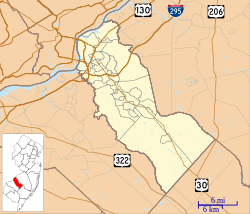 The lightship Barnegat in Philadelphia | |
| History | |
|---|---|
| | |
| Name | Barnegat |
| Operator | U.S. Coast Guard |
| Builder | New York Shipbuilding Company |
| Cost | $89,030 |
| Launched | 1904 |
| In service | 1904 |
| Out of service | 1967 |
| Status | Moored at Pyne Poynt Marina in Camden, New Jersey |
| General characteristics | |
| Displacement | 668 tons |
| Length | 129 ft (39 m) |
| Beam | 28.6 ft (8.7 m) |
| Draft | 12.6 ft (3.8 m) |
| Propulsion | Steam-one compound surface condensing engine, 16" and 31" bores x 24" stroke, 325 IEP; 2 boilers 9'3" dia x 164" long, 100 psi; propeller 79" dia; also rigged for sail initially |
| Speed | 10 knots (19 km/h) |
Barnegat | |
| Location | North 7th Street, Camden, New Jersey |
| Coordinates | 39°57′21″N75°6′46″W / 39.95583°N 75.11278°W |
| Area | 0.3 acres (0.12 ha) |
| Built | 1904 |
| Architect | New York Ship Building and Dry Dock Company |
| NRHP reference No. | 79002317 [1] |
| NJRHP No. | [2] |
| Added to NRHP | 29 November 1979 |
The United States lightship Barnegat (LV-79/WAL-506), is located in Camden, Camden County, New Jersey, United States. The lightship was built in 1904 and was added to the National Register of Historic Places on 29 November 1979.



